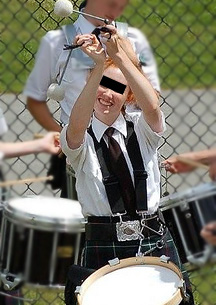Lessons earned
 There’s a hardly a person out there who has not at one time won a prize when their teacher was judging, and I would be willing to bet that of the 99 per cent of pipers and drummers who have been rewarded by their instructor, nearly all of them felt a bit regretful.
There’s a hardly a person out there who has not at one time won a prize when their teacher was judging, and I would be willing to bet that of the 99 per cent of pipers and drummers who have been rewarded by their instructor, nearly all of them felt a bit regretful.
I know I have.
1984. I had been living in Scotland, spending my third year of college at the University of Stirling. I had the extreme good fortune to be taken on as a regular pupil by someone of prodigious knowledge and renown strictly for piobaireachd, and another even more renowned person for light music. (Why I didn’t occasionally seek one for the other music, I don’t know, but that’s another story.) I also was lucky enough to access the prodigious knowledge of another prominent person for a few weekends in the fall of 1983.
I had been preparing all year for the Silver Medal. The event in 1984 called for contestants to submit six of their own choice of tunes. I keenly learned up the tunes set for the Gold Medal contests, since it was all good. I got all of these from my main piobaireachd teacher. I’d been playing well enough over the summer to pick up prizes around the games.
But then the judges for the Silver Medal were revealed in July. At the time I was extremely excited to learn that not one, not two, but all three of my teachers would be on the Silver Medal bench at Inverness. Since I believed that the teacher/pupil/judge connection was an acceptable part of the game, I figured that I had hit the jackpot. What great luck!
After getting nothing at Oban, Inverness came around. I was the first to play after the lunch break. I thought that I played as well as I possibly could, which is all you can hope to do. The result was announced, and I was first. All three of them told me later that their decision was unanimous.
While I felt that I deserved the prize, I also felt awkward at the time and ever since about the award. I knew then as I know now that many prizes big and small have been won with teachers judging their students. As far as I know, there’s no rule anywhere against the practice, and only “policies” with some organizations that asks teachers to avoid judging their pupils.
I’ve written before that the practice of teachers judging their students is inevitable, since the best teachers make the most knowledgeable judges and vice-versa. Maybe tellingly, I came up with that thesis when I was actively competing. People often find ways to reconcile such dilemmas in ways that suit us at the time.
I’ve since changed my mind. Teachers judging pupils can and should be avoided. If for nothing else, a teacher should avoid the practice for this fundamental reason: it’s not fair to the pupil. It’s not fair because the student may well have deserved the prize, and probably did, but his or her peers – every one of them – will have at least a shade of doubt.
I don’t for a second think that back in 1984 my teachers were anything but ethical and honest, and my sense of ethics may differ substantially from others. I respect other opinions. I also think that the ethical sense of players, teachers and judges have changed over the last three decades.
But all too often I sense teachers accept judging pupils for what appears to be a selfish reason: to further their own reputation as a teacher via the success of their student. The better the pupil does, the better the instructor appears.
Some players dodge the issue by saying that a judge who’s judging them isn’t really an “instructor” because they see them only periodically, or receive only casual feedback. That may be so, but, as a friend recently pointed out, the player is quick to list the very same person as a “teacher” in their autobiographical sketches.
Some judges dodge the issue with the well-worn contention that, if you prohibit teachers from judging their pupils, there won’t be enough judges to go around. I don’t believe that. It just takes adroit planning and full disclosure. Judges need to tell organizers who they’re teaching, and then let them organize events accordingly.
Competitions are about the competitors, not the judges. Teachers should not put their students in such compromising situations. Ironically, prizes won by students of judges are an injustice to the pupil who needs to be seen to earn prizes fairly, strictly on his or her own merits.
And declining to judge pupils in contests could be one of the most important lessons an instructor can teach.
 The current pipes|drums Poll attempts to discover how skilled pipers and drummers around the world (that is, the over-achieving musicians who follow the magazine) respond to the question, How long do you think it takes to become a pretty good tenor drummer? The results are interesting.
The current pipes|drums Poll attempts to discover how skilled pipers and drummers around the world (that is, the over-achieving musicians who follow the magazine) respond to the question, How long do you think it takes to become a pretty good tenor drummer? The results are interesting.
































